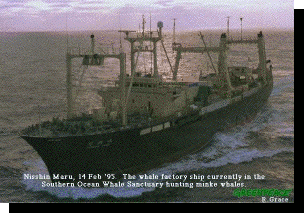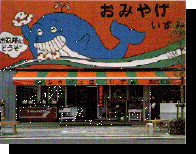Special Action Alert - JAPAN
| Home > Action Alerts > Japanese Whaling | SITEMAP |
JAPAN STILL DEFIES INTERNATIONAL LAWDuring the first week of November each year Japanese whaling vessels leave the ports of Hiroshima and Yamaguchi in western Japan bound for the Antarctic to catch another haul of Minke whales. Then later into the North Pacific for even more destruction of the Minke populations.
Click here to read News on Japanese Whaling
Where are they going?Into the "Southern Ocean Whale Sanctuary" a place designated by International Law for the protection of all whale species. The Antarctic and its inhabitants are also protected by the "Antarctic Treaty" of 1959 to which Japan is also a signatory! During yearly meetings of the world's whaling organisation, to which Japan is a member, resolutions on the rules of whaling are made and each year:
In past years, and again in 1998, resolutions were made:
The Japanese Government has ignored the law and bowed down to big business and to the "all-mighty yen" by issuing permits for the slaughter of Minke whales in the Antarctic. Without these permits their whaling fleet would be dry-docked and the killing stopped. So, how can Japan issue permits while the rest of the world abstains? Through an old rule implimented many years ago, and designed to get whalers to care a little about the well being of the heards of whales instead of the profits they made, Japan is bye-passing the "Moratorium on Commercial whaling" by calling their hunting "Scientific". Their scientific whaling killed 440 whales last season while Norway's declared "Commercial whaling", which is banned, killed about the same amount. So how's Japans whaling scientific? Further investigation reveals that Norwegian whalers sell their whale meat to markets within their own borders, for their own consumption, and call it "commercial". Japanese whalers sell their whale meat to markets within their own borders, for their own consumption, and call it "scientific". So what's the difference? Japan says it needs to know what the Minke whales are eating. So they have to kill the animals to look inside their stomachs. Since the whale is now dead and guided by a rule (one that they want to follow) they bring the whale meat back to Japan and sell it so that it is not wasted. If Japan didn't kill the whales to start with they wouldn't have to dispose of them. Truth is we all know what whales eat! You only need read a book! Another interesting observation worth mentioning is why the whale meat needs to be sold.
Japan sells the meat to help fund the research!I'm pretty sure researchers all over the world would like to get funding for their research from the "field", rather than grovel to their sponsors, except for one thing. Responsible, intelligent people don't kill the animals they are trying to save. What would happen if researchers killed the Rhinoceros to sell the horn to fund the research? There would be no rhino's left to research! What about Panda's? So Japan, what came first the chicken or the egg, the research or the market? It seems pretty simple to me . . .
There is a thing called "benign research" it doesn't kill whales and it is expensive but it doesn't put whale meat on the table. Does it? |

